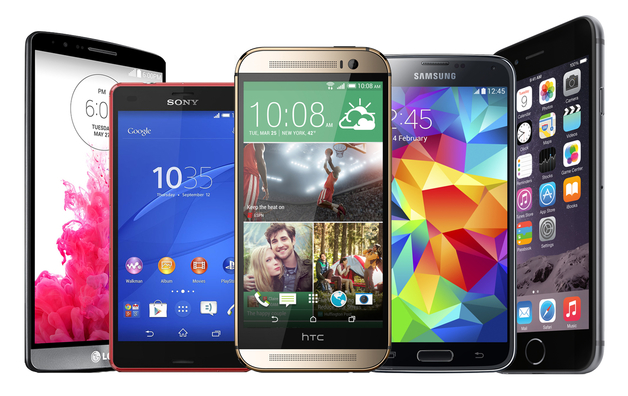Telecom
Nigeria, SA Drive Strong Growth in Africa’s Smartphone Shipments

A total of 22.4 million smartphones were shipped in Africa during the second quarter of this year (Q2 2018), according to the latest insights from International Data Corporation (IDC).
The global technology research and consulting firm’s Quarterly Mobile Phone Tracker shows that Africa’s smartphone shipments increased 9.8% quarter on quarter (QoQ) and 6.0% year on year (YoY) in Q2 2018.
The market’s buoyant performance was spurred by the growing popularity of low-end to mid-range devices. Transsion brands continued to lead the continent’s smartphone space in Q2 2018, accounting 35.4% of shipments. Samsung followed in second place with 23.2% share.
By contrast, the feature phone market was down 1.1% QoQ and 5.8% YoY in Q2 2018, but – with shipments totaling 31.4 million units – these devices still constitute a 58.3% share of Africa’s overall mobile phone market as they cater to the needs of the continent’s huge low-income population (mainly in rural areas) by providing basic mobile communications that are priced very competitively.
Telco and Itel continued to lead feature phone category in Q2 2018 with a combined unit share of 59.9%, followed in third place by HMD on 9.0%.
Looking at the overall picture, the region’s combined mobile phone market totaled 53.8 million units in Q2 2018, with shipments up 3.2% QoQ but down 1.2% YoY.
The continent’s two biggest markets – Nigeria and South Africa – saw a marked improvement in the performance of their overall mobile phone markets, posting YoY growth of 13.0% and 25.0%, respectively.
“The Nigerian economy remains stable and has begun to show signs of steady improvement in terms of consumer demand for mobile phones.
“The country saw smartphone shipments of 2.7 million units in Q2 2018, up 15.8% YoY, with strong marketing support from telecom operators for most brands proving instrumental. However, ongoing currency issues and falling consumer purchasing power suggest Nigeria is not set for a sustained surge in smartphone shipments,” says Arnold Ponela, a research analyst at IDC.
South Africa remains the continent’s most developed telecommunications market, with smartphone shipments up 17.4% YoY in Q2 2018 to total 3.4 million units.
“Numerous new entrants to the South African market are now offering affordable smartphones that boast very similar features to the leading brands.
“As such, we expect the country’s migration away from feature phones to continue at a progressive pace.
This transition from feature phones to smartphones is reflected by the fact that the market continues to be dominated by low-end to mid-range devices priced below $150,” says Ponela.
IDC’s research shows that 4G LTE networks are spreading their reach in Africa, with shipments of 4G LTE devices increasing 11.8% QoQ in Q2 2018 to constitute 62.6% of the smartphone market.
“Despite a drop in the prices of entry-level 4G phones, 2G and 3G mobile devices remain far more economical, making it difficult for operators to migrate clients over to newer technologies.
“Price sensitivity means that many African consumers prefer to stick with 3G phones, and this is likely to continue until 4G devices fall to a price point where they are affordable to a much larger segment of the continent’s consumer base,” says Ramazan Yavuz, a research manager at IDC.
Looking ahead, IDC expects Africa’s overall mobile phone market to grow 2.6% QoQ in Q3 2018, with overall shipments to increase slightly through 2018, leading to YoY growth of 0.4% for the year as a whole.
“IDC predicts that 5G phones will reach the market in 2020, when rollouts of 5G networks will start in select African countries,” says Yavuz. “However, demand for feature phones is unlikely to be impacted significantly as these devices will continue to serve a purpose in areas with no LTE coverage.”
Telecom
Oyedele Dismisses Claims Bank Accounts Without TIN Will Be Frozen

Taiwo Oyedele, Chairman of the Presidential Committee on Fiscal Policy and Tax Reforms, has dismissed reports that bank accounts not linked to a Tax Identification Number (TIN) will be frozen or automatically debited from January 1, 2026.

Taiwo Oyedele
Oyedele described the claims as false and misleading, warning Nigerians against panic over misinformation surrounding recent tax and financial reforms.
In a post on his X handle Tuesday morning, he wrote: “Don’t let anyone manipulate you. Your bank account is safe. Misinformation makes you panic and fear a reform that is designed to help you.
“When they tell you that your account will be frozen or automatically debited from January 2026, ask them for the evidence in the new law. Be wise.”
He stressed that no provision in the new tax laws authorises the freezing of bank accounts, adding that the rumours are part of widespread misrepresentation of the reforms.
The committee chairman reiterated that the reforms are intended to simplify Nigeria’s tax system and ease the burden on ordinary citizens, not to impose punitive measures on bank customers.
Telecom
Amazon Blocks 1,800 North Koreans From Job Applications

US tech giant, Amazon has disclosed that it blocked more than 1,800 North Koreans from applying for jobs, amid growing concerns that Pyongyang is deploying large numbers of IT workers overseas to earn and launder funds.

Amazon
In a LinkedIn post, Amazon’s Chief Security Officer, Stephen Schmidt, said North Korean nationals have been attempting to secure remote IT roles with companies around the world, particularly in the United States.
He noted that the company recorded nearly a one-third increase in such applications over the past year.
According to Schmidt, many of the applicants operate through so-called “laptop farms” — computers physically located in the US but remotely controlled from abroad.
He warned that the issue is not unique to Amazon and is likely occurring at scale across the tech industry.
He added that common red flags include incorrectly formatted phone numbers and questionable academic credentials.
The issue has previously drawn the attention of US authorities. In July, a woman in Arizona was sentenced to more than eight years in prison for running a laptop farm that helped North Korean IT workers obtain remote jobs at more than 300 US companies.
Officials said the scheme generated over $17 million in revenue for both the woman and North Korea.
Last year, South Korea’s intelligence agency also warned that North Korean operatives were using LinkedIn to pose as recruiters, approaching South Koreans working at defence companies in an attempt to steal sensitive technological information.
“North Korea is actively training cyber personnel and infiltrating key locations worldwide,” Hong Min, an analyst at the Korea Institute for National Unification, told AFP.
He added that, given Amazon’s business model, the motivation behind such operations is largely economic, with a high likelihood of attempts to steal financial assets.
North Korea’s cyber warfare programme dates back to at least the mid-1990s and has since expanded into a cyber unit of about 6,000 personnel known as Bureau 121, according to a 2020 US military report.
In November, Washington announced sanctions against eight individuals accused of being state-sponsored hackers, alleging their illicit activities were carried out to fund North Korea’s nuclear weapons programme.
The US Treasury has also accused North Korea-linked cybercriminals of stealing more than $3 billion over the past three years, primarily through cryptocurrency-related crimes.
Telecom
Treepz Launches Direct Flight Bookings to UK, Canada, UAE and 210 Global Destinations

Treepz, Africa’s leading mobility and travel technology company, has officially launched direct flight bookings on its platform, enabling customers to search, compare and book flights to more than 210 destinations worldwide, including the United Kingdom, Canada and the United Arab Emirates.

The development marks a major milestone in Treepz’s transition from a mobility provider into a fully integrated travel platform. With the new service, travelers can now complete the entire booking process — from flight search to payment — directly on the Treepz website without relying on multiple agents or third-party platforms.
Speaking on the launch, Mr. Onyeka Akumah, Chief Executive Officer and Founder of Treepz, described the initiative as a defining moment for the company and for travel access across Africa.
He said launching flight bookings to serve customers with flights to over 200 destinations was a major achievement, noting that travelers could now search for flights, enter their details, make payments with their cards, and complete bookings instantly on the platform without delays or switching between multiple websites.
The launch comes at a critical time for the African travel market. December is widely regarded as the busiest travel season on the continent, driven by holiday vacations, family reunions, weddings, festivals and end-of-year celebrations.
Millions of Africans travel locally and internationally during this period, often facing challenges with slow booking systems, unclear pricing and fragmented services.
Treepz’s new flight booking system is designed to address these challenges by offering a faster, more intuitive and reliable experience.
Customers can now search and book flight tickets directly on the Treepz website, compare prices and travel options in real time, make payments using any card option, and complete bookings faster without switching platforms.
Treepz has outlined ambitious plans for 2026, including unlocking access to over six million hotels globally, which will allow travelers to book flights and accommodation together in one seamless flow.
The company also plans to expand its car rental services into Europe and South America, further strengthening its position as a one-stop travel ecosystem.
According to Akumah, these developments will significantly reduce planning time for both leisure and corporate travelers, while giving customers more control and convenience.
Treepz has already facilitated more than six million movements across multiple cities and countries, ranging from daily commutes and corporate transportation to group travel and event logistics. With active operations across Africa and recent expansion into Canada, the company continues to grow its international footprint.
The addition of flight bookings strengthens Treepz’s ability to serve global travelers while maintaining its reputation for reliability and customer-focused service.
By integrating flights, accommodation, ground transportation and experiences into one platform, Treepz is positioning itself as more than a mobility provider.
The company is evolving into a comprehensive travel solution designed for modern travelers who value speed, clarity and convenience.
Industry analysts say the move could redefine travel access across Africa, particularly during peak seasons when demand for efficient booking systems is highest.
With this launch, Treepz has taken a bold step toward building a unified, tech-driven travel ecosystem that connects Africa to the world.

 News3 days ago
News3 days agoUS Okays $2.1Bn for Christian Healthcare in Nigeria

 General News3 days ago
General News3 days agoThe Mood Market to Light Up Lagos with a Rooftop Gifting, Food & Lifestyle Fair this Christmas

 E-Financial3 days ago
E-Financial3 days agoSterling Bank, Water.org, Sterling One Foundation Partner on WASH Loan for Millions

 News3 days ago
News3 days agoSERAP Asks Tinubu to Release CTC of Tax Bill

 Broadcasting3 days ago
Broadcasting3 days agoTim Akano Recounts 20-Year Growth, Media Support at NITRA End-of-Year Meet

 News2 days ago
News2 days agoUS Begins Partial Visa Ban on Nigerians January 1

 General News3 days ago
General News3 days agoLeo Stan Ekeh: A “Rare Avis”, an Unconquerable Entrepreneur

 General News3 days ago
General News3 days agoFCCPC Forces Ikeja Electric Into Compliance, Unseals Headquarters After Rights Breach



























